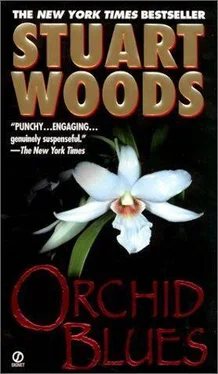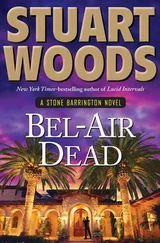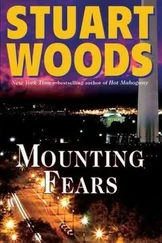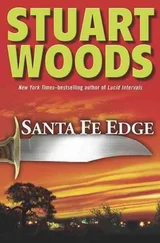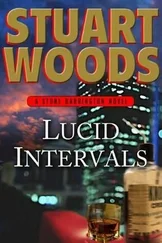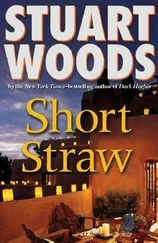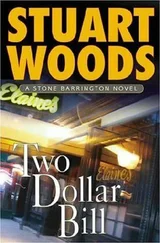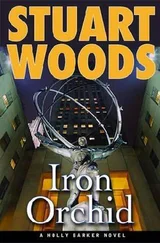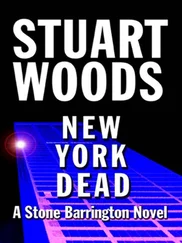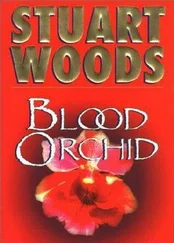"How about right now?"
"Where are you?"
"I'm on the Piper ramp at the Vero Beach airport."
"I can be there in twenty minutes."
"The tail number is November one, two, three, tango foxtrot."
"I'll find you." She punched off and took a right on Highway 1.
Stone Barrington was standing next to his new airplane, talking to another man as she pulled up. "Stay, Daisy," she said, and got out of the car.
Stone introduced the man as his instructor, then the man left. "Climb in," he said.
She walked up the airstair door and into a leather-upholstered cabin. Four seats in club style made up the rear portion, and she climbed forward into the copilot's seat.
Stone followed her and sat in the-left seat. "What do you think?"
"It's beautiful; it even smells beautiful. Awful lot of gauges and instruments, though. I'm used to simpler airplanes, like Cessna 172s."
"It's a much more complicated aircraft," Stone said.
"When do you fly her home?"
"Probably the day after tomorrow. My first flight went well."
"Let me run something by you."
"Okay."
She told him about following Emily Harston and about the little town she discovered.
"Seems strange, doesn't it?" Stone said.
"Yes, it does. Have you ever run across anything like that?"
"Can't say that I have."
"Could you call the guy in New York and see if you can find out anything more about the place these people lived, the ones who disappeared?"
"Sure, glad to."
"I'd appreciate it if you'd call me at home tonight and tell me what you find out. Ham and I are going out there tomorrow."
"Ham?"
"My father. He's a retired army master sergeant and a fisherman. We're going to poke our noses into that place, on the pretext of looking for some fishing, and see what we can see."
"This is all very interesting. I'd want to come, if I wasn't flying again tomorrow."
"Maybe next time," she said. She looked at her watch. "Well, I'd better get back to the station."
They both got out of the airplane.
"She's a lovely color, too." The airplane was a rich cream on top and a deep red on the bottom.
"Thanks. Holly, I think you ought to be very careful tomorrow. Don't press your luck in this place."
"Don't worry."
"Good idea, I'll do that."
They shook hands.
"I'll call you tonight after I've called New York," he said.
"Thanks, Stone." Holly got back into her car and, with Daisy, drove back toward Orchid Beach.
Holly reached home as the sun was setting over the island. Preoccupied with thinking about the little town she had found, she entered the house expecting Jackson to be watching the evening news with a drink in his hand, and the cold darkness shocked her.
She found a light, fed Daisy and let her outside, then went and sat in Jackson's chair, feeling bitterly lonely. She flicked on the news, just to have some noise in the house, but the screen was a blur in her mind, and so was the sound.
Then Daisy scratched on the door, and Holly went to let her in. She stood, looking out at the sea reflecting the dying light in the sky, and she thought it made the water look as if it were lit from underneath. She loved this time of day. Sometimes she'd lure Jackson away from the TV, and they'd sit on a dune with a drink and watch the light die.
She was surprised by a hunger pang and went to the fridge to see what she could have for dinner. She settled for a frozen meal, since Jackson had pretty much cleaned out the fridge in anticipation of their honeymoon absence. She sat in front of the TV while a rerun of Law amp; Order played. She'd seen it already, and even though she had, she wasn't able to follow the plot anyway, in her present state of mind. She seemed unable to organize coherent thoughts about anything, and her mind wandered. Fragments of days with Jackson played around in her brain, and sex entered into the mental pictures. She would never make love again, she was sure. After Jackson, what would be the point?
The phone rang, and she picked it up.
"Hello?"
"Hi, it's Stone."
"Oh, hello." She had forgotten she had asked him to call.
"I talked with the ex-trooper personally this time, but he wasn't able to help much. This group, this religious sect that disappeared, apparently did so in an orderly fashion. I think I mentioned before that they had sold their property and their vehicles. In the months after the bank robbery, the trooper ran a check to see if any of their driver's licenses had been transferred to another state, but nothing turned up."
"Did they actually look for these people?"
"Yes, but not very hard. After all, they had no hard evidence against the woman who had been a teller, and she had resigned from her job and had given two weeks' notice, so there was no question of her running from the law. These people left the state the same way thousands of others move, except they didn't leave a forwarding address. The only mail they received after their departure was junk mail, so they had apparently closed out all their accounts-phone, electric, etcetera-and paid whatever was due. No bill collector or lawyer turned up looking for them. The trooper was unable to find out what means of transportation they had used to leave town. One day they were there, the next they were gone."
"What sort of area did they live in?"
"A county of small towns and farms. The group owned a sizable farm, but they sold it. They left it in perfect order for the new owner, complete with a tractor and other essential equipment, so apparently they didn't plan to take up farming again in another location."
"It's just a total blank, isn't it?" she said.
"Seems that way, and it's a little late in the game to start tracking these people. If they left no trace then, there would certainly be no trace now."
"I suppose you're right."
They were both silent for a moment.
"How are you doing?" he asked quietly, and in such a way that she knew it wasn't simply a polite question.
"I'm just sitting here letting my mind wander, and all I seem to be able to think about is Jackson. Have you ever lost anybody?"
"My parents, but not in the same way. They had long and productive lives and, when they finally became ill, died quickly."
"Have you ever lost a friend by violence?"
"I've known cops who were killed in the line of duty. I've never personally known an innocent bystander like Jackson who died in a crime."
"You know, it's said that when people have limbs amputated, the nerve endings in the stump make them think they can still feel the leg or arm."
"I've heard that."
"That's how it feels, as if some important part of me had suddenly been amputated, but I can still feel it. It's still real."
"It won't always be that way."
"I'm afraid to hope for that. I might feel better not losing that part of me completely."
"After my father died-he followed my mother by a couple of years-I would find myself dialing his number, expecting to talk to him. It took a couple of weeks to get past that. I'd want his advice, and I'd just pick up the phone, then feel like an idiot"
"I'm not the first to feel this way, I know," she said, "but it's the first time for me, and I don't like it."
"I wish there were something I could say to make it better."
"Thanks. I guess I'll just have to find a way to deal with it. It's okay when I'm working-I told you how I can switch it off. But when I got home tonight…" Her voice trailed off.
"Have you had dinner yet?" he asked.
"Yes, I just ate something, but thanks for asking." She was sorry she had eaten; she would have enjoyed his company. "Jackson would have liked you," she said.
"I liked him, for the brief time we knew each other."
Читать дальше
